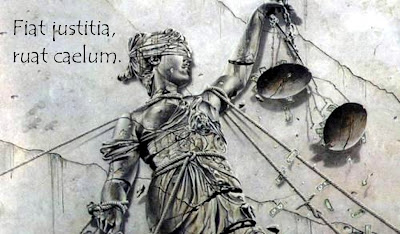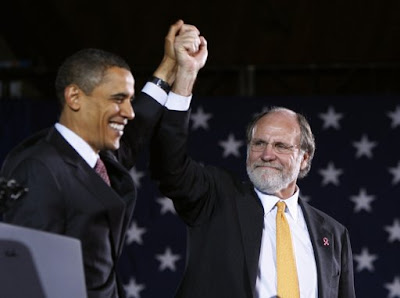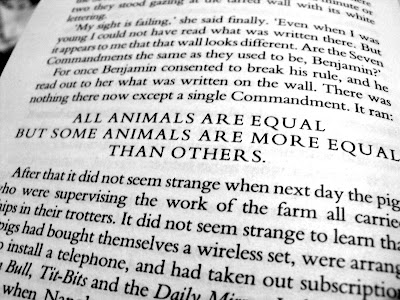“Ayn Rand's 'philosophy' is nearly perfect in its immorality, which makes the size of her audience all the more ominous and symptomatic as we enter a curious new phase in our society....to justify and extol human greed and egotism.”
Gore Vidal
"It is not Man but nature that raises into one class those who are chiefly intellectual, in another those who are marked by muscular strength and temperament, and in a third those who are distinguished in neither one way or the other, but show only mediocrity -- the last-named represents the great majority, and the first two the select. The superior caste -- I call it the fewest -- has, as the most perfect, the privileges of the few...
The order of castes, the order of rank, simply formulates the supreme law of life itself; the separation of the three types is necessary to the maintenance of society, and to the evolution of higher types, and the highest types -- the inequality of rights is essential to the existence of any rights at all. A right is a privilege. Everyone enjoys the privileges that accord with his state of existence.
Wrong never lies in unequal rights; it lies in the assertion of equal rights."
Friedrich Wilhelm Nietzsche, Der AntiChrist
In light of the recent outcries by billionaire Tom Perkins for fair and loving treatment, I thought it might be interesting to explore the mindset that pictures the doyens of Wall Street, and those who have taken fortunes out of the dot.com and housing bubbles, as the real victims of the financial collapse and The Recovery™.
I think that part of this comes from the phenomenon that for some people, gratitude is their natural response to good fortune, even if it has come from hard work. Whereas others are possessed by a restlessness, an insatiable spirit, and their response to everything is 'I deserve more!.'
Tom Perkins not only wishes his wealth, and his banal collection of toys, but he wishes to have public adulation as well, or at least the power to compel people to defer to him.
Mr. Frank thinks that this time around the cultural response to a Great Depression is 'backwards,' as compared to that of the 1930's, and one might tend to agree. There certainly has not been the rising of a national sympathy for victims, or a proper outrage at the arrogance and excesses of the financiers.
But this might overlook the fact that the US was a bit of an outlier back then, as only a few countries turned towards progressive reforms, while other developed nations embraced the hardness of totalitarianism, and even went so far as systematically murdering the weak.
But it is a mistake that the US is some sort of paragon, if one recalls John Steinbeck's The Grapes of Wrath. The allure of selfishness and evil is a natural tendency that we overlook in our economic models, among other things. And we certainly ought not overlook the consecration of the country to the principle that 'greed is good,' or more plainly to Mammon, in the latter part of the last century.
I agree with him that Obama has been a pivotal disappointment, and I was interested to hear the reasons why he thought this was so. Overall I found his perspective to be interesting, as though he was not an American historian and journalist, but some foreign observer sharing an exterior perspective of wonderment.
I have started the tape beyond the introductory remarks and welcomes at this talk he gave in Seattle.
"Do you think he is so unskillful in his craft, as to ask you openly and plainly to join him in his warfare against the truth? No; he offers you baits to tempt you. He promises you civil liberty; he promises you equality; he promises you trade and wealth; he promises you a remission of taxes; he promises you reform.
This is the way in which he conceals from you the kind of work to which he is putting you; he tempts you to rail against your rulers and superiors; he does so himself, and induces you to imitate him; or he promises you illumination, he offers you knowledge, science, philosophy, enlargement of mind. He scoffs at times gone by; he scoffs at every institution which reveres them.
He prompts you what to say, and then listens to you, and praises you, and encourages you. He bids you mount aloft. He shows you how to become as gods. Then he laughs and jokes with you, and gets intimate with you; he takes your hand, and gets his fingers between yours, and grasps them, and then you are his."
J.H.Newman, The Times of Antichrist






































